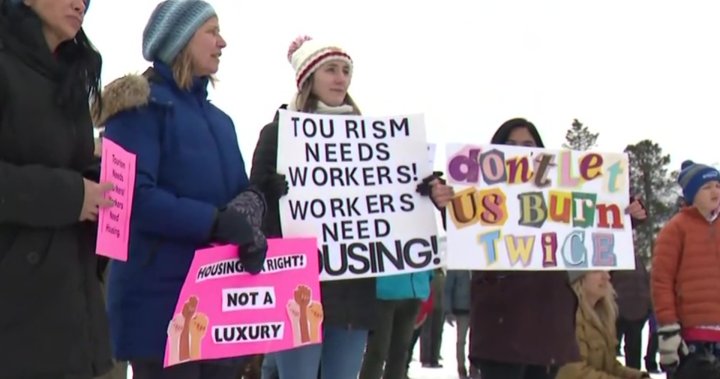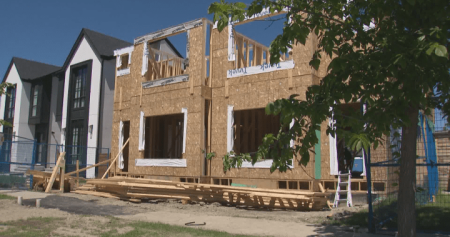The devastating wildfire that swept through Jasper last year, displacing approximately 2,000 residents, has left a lingering scar on the community, particularly for those who lost their homes. Sabrina Charlebois, one such resident, finds herself grappling with the broken promises of the United Conservative Party (UCP) government regarding interim housing. Six months after the inferno, she and many others remain displaced, living in temporary accommodations like hotels, facing an uncertain future. The UCP’s initial commitment to provide 250 modular housing units, announced with much fanfare by Social Services Minister Jason Nixon, has seemingly evaporated, leaving residents frustrated and disillusioned. Charlebois, instrumental in organizing a protest to voice the community’s discontent, questions the government’s motives and criticizes their abrupt reversal on the promised housing. The situation has left her and other displaced residents feeling abandoned and betrayed by the very government that pledged to support them.
The crux of the dispute lies in the conditions attached to the provincial funding. The UCP government has stipulated that the $112 million earmarked for housing is contingent upon the town of Jasper agreeing to construct permanent, single-family homes. Furthermore, they demand that the federal government expand Jasper’s boundaries into the surrounding national park to provide the necessary land. This ultimatum has created a stalemate, as municipal officials argue that the provincial plan is impractical and insufficient. Land-planning regulations, such as parking and setback requirements, mean that permanent homes would occupy considerably more space than temporary modular units, limiting the number of homes built to just 60. This falls far short of the estimated 600 families requiring temporary housing while they rebuild their lives and homes. The government’s plan, critics argue, exacerbates the pre-existing housing shortage in Jasper, leaving a vast majority of displaced residents with no viable options.
Charlebois’s personal predicament highlights the urgency of the situation. Her insurance coverage for hotel accommodation is dwindling, with an April deadline looming. Other families face even more immediate deadlines, with coverage expiring within a month. The desperation is palpable, leaving residents questioning why they are forced to fight for a promise made by their government. The prolonged displacement, coupled with the government’s inaction, has left Charlebois and others feeling homeless and adrift. The lack of communication and concrete solutions from the UCP government has only added fuel to the fire of their discontent. They find themselves battling not only the aftermath of the fire but also the broken promises of those they entrusted to lead them through the recovery process.
Opposition voices have also echoed the concerns of the displaced residents. NDP housing critic Janis Irwin, present at the protest rally, characterized the government’s back-and-forth as disrespectful. She points to previous provincial governments’ swift responses to similar disasters, providing mobile homes to Slave Lake and Fort McMurray within months of the 2011 and 2016 wildfires, respectively. Irwin criticizes the current government’s focus on disputes with the federal government and Parks Canada rather than prioritizing the immediate needs of the Jasper residents. This approach, she argues, is counterproductive and only delays the recovery process, leaving the community in limbo. The political wrangling, according to Irwin, is a distraction from the real issue at hand: providing timely and adequate housing for those who have lost everything.
In the face of the provincial government’s stalled plan, the municipality and Parks Canada are exploring alternative solutions. They are seeking work camp-style housing and duplexes as temporary accommodations, bypassing the provincial proposal altogether. This proactive approach underscores the urgent need for interim housing and demonstrates a commitment to addressing the needs of the community. While these alternatives may not be ideal, they offer a more immediate and practical solution compared to the government’s seemingly unattainable plan. The municipality’s efforts demonstrate a willingness to find workable solutions, even if it means circumventing the provincial government’s plan.
Despite the mounting pressure and criticism, the UCP government maintains its stance. Ministers Nixon and McIver, in a joint statement, deflected responsibility, placing the blame squarely on the federal government’s reluctance to provide land. They assert that the province is ready and willing to build homes for the displaced residents, but their hands are tied without the necessary land. Furthermore, they claim that the federal government plans to bring in single-bedroom trailers, but criticize potential delays and urge Ottawa to expedite the process. This exchange of accusations further complicates the matter and highlights the disconnect between the provincial and federal governments in addressing this critical issue. The lack of cohesive action only prolongs the suffering of the Jasper residents, who remain caught in the crossfire of political maneuvering.










